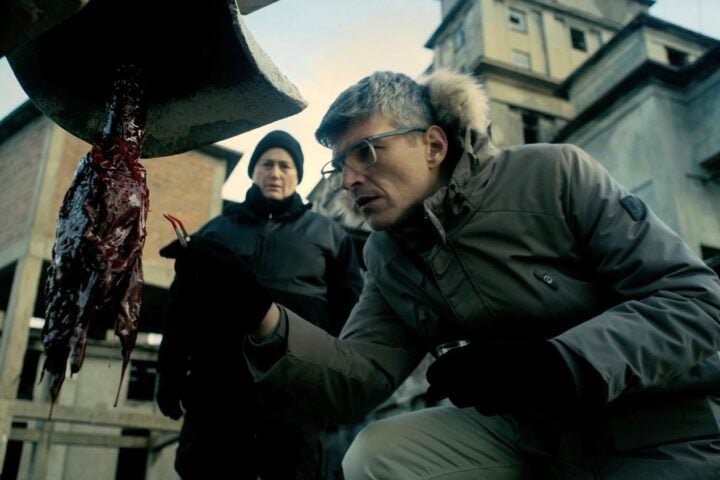Much of the criticism thrown at Alex Garland’s Civil War centered on it presenting the titular conflict without really explaining its origins. Tony Gerber and Jesse Moss’s documentary War Game goes the other way by showing in very specific ways not how a modern-day American civil war might be fought but how one might start.
Gerber and Moss present essentially a filmed play set largely in a mock Situation Room. The unscripted “war game” that they shot as it happened was produced in 2023 by Vet Voice, a veterans’ advocacy group warning about right-wing fanatics infiltrating the American military. Vet Voice brought together a gaggle of real-life politicians, intelligence officials, and military experts to play fictional versions of themselves trying to solve a future crisis based in history: On January 6, 2025, a losing presidential candidate refuses to concede the election and calls on “patriots,” including the military, to stop the vote certification.
War gaming is a common exercise used by strategic analysts where two sets of experts compete to beat each other in scenarios mirroring reality close enough to provide useful insights about future threats and solutions. In War Game, this comes across like Dungeons & Dragons for political science and national security nerds, only with real-world stakes.
One set, the Blue Team (what one participant calls “the good guys”) led by elected President John Hotham (played by former Democratic governor of Montana Steve Bullock), is trying to maintain order as angry anti-certification protests pop up at state capitals. The rival set, Red Cell, led by veterans turned anti-extremist activists Kris Goldsmith and Chris Jones, plays the leaders of an invented Three Percenter-like radical group called the Order of Columbus sewing chaos on social media and trying to incite active-duty military to join the protests. The game’s producers, including Vet Voice ex-Marine Janessa Goldbeck, act as the creative team pushing out new developments via fictional news broadcasts and even streamed declarations from the failed candidate and his followers as the game’s six-hour clock ticks down.
The film creates tension by cutting between Blue Team’s slow and deliberate consultations to Red Cell’s near-giddy reactions to the producers’ eye-of-God commentary. Recollections from game participant veterans about the extremist threats they witnessed provide a personal angle.
War Game refreshingly subverts the tropes of fictional Situation Room thrillers like Rod Lurie’s Deterrence, which tend to value square-jawed leaders taking tough stands and overriding uncertainty. Bullock’s thoughtful and listening style is inherently undramatic and uncinematic, especially in comparison to the take-action-now viewpoint presented by his anxious senior advisor (played by former North Dakota senator Heidi Heitkamp). But the producers and Red Cell leaders note that his deliberate avoidance of potentially knee-jerk overreactions like invoking the Insurrection Act can deprive the extremists of the oxygen they need to fuel the fire.
While packed with potentially riveting “what-if” scenarios, War Game delivers far less insight than it could have. Even though the filmmakers are focused on the threat (including an on-screen note about how one in five charged January 6 rioters were veterans), they include very little evidence on the extent of extremism in the military (Charlie Sadoff’s frightening 2023 documentary Against All Enemies, which also featured Goldsmith, covered this far better).
Ultimately, the film’s narrative is uncompelling, with much of the climactic moments of the war game dealt with in glossed-over hand-wave fashion. It’s possible that material was edited out (the filmmakers note at the end that Vet Voice provided the Pentagon, Congress, and the White House with a “confidential analysis”) to avoid giving ideas to bad players. But by setting up such a potentially cataclysmic scenario and not convincingly illustrating how it could be resolved or stopped from occurring in the first place, War Game undercuts the very reason it was made.
Since 2001, we've brought you uncompromising, candid takes on the world of film, music, television, video games, theater, and more. Independently owned and operated publications like Slant have been hit hard in recent years, but we’re committed to keeping our content free and accessible—meaning no paywalls or fees.
If you like what we do, please consider subscribing to our Patreon or making a donation.



